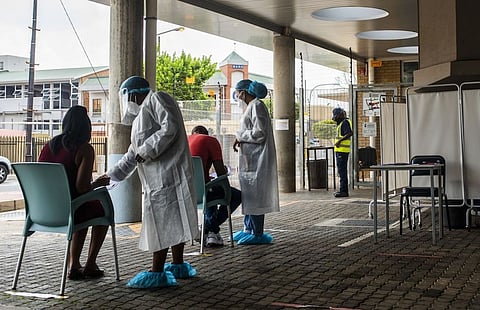Despite rising Covid-19 deaths, SA’s are hesitant to receive the vaccine
The Delta variant has seen South Africa coming to grips with a severe third wave, currently eclipsing both the first and second waves in terms of infections and deaths. As Bloomberg reports, SA deaths from the virus "rose 72% week-on-week as of Monday". This is according to data compiled by the news agency. Alarmingly, this is the fifth-fastest increase in the world. Despite rising deaths and ever-increasing infections, hesitancy around the Covid-19 vaccine could be one of the reasons behind the low take-up of the inoculation, locally. Talking to Bloomberg, senior researcher at the Wits Vaccines and Infectious Diseases Analytics unit, Vicky Baillie, said that this is certainly the case. "I've spoken to a lot of people who just don't understand the information that's available, but if you talk them through the information they 100% come around." Of course, we cannot attribute the slow take-up to just this and anti-vaccine propaganda. Delays in the procurement of the vaccine certainly played a big part, too. "The government was slow to place orders when other countries were stocking up last year, opted not to use the AstraZeneca candidate following adverse trial results, while deliveries from Johnson & Johnson were delayed after a manufacturing glitch." – Jarryd Neves
Surging death toll fails to convince vaccine-wary South Africans
By Monique Vanek and Leah Wilson
(Bloomberg) – One of the world's fastest pace of deaths from Covid-19 infections hasn't been able to trounce widespread hesitancy over vaccines in South Africa.
Deaths from the virus in the country rose 72% week-on-week as of Monday, according to data compiled by Bloomberg, the fifth-fastest worldwide and behind only Zimbabwe on the continent. Yet a lack of communication coupled with anti-vaccine propaganda may be responsible for daily doses languishing almost 50% below President Cyril Ramaphosa's target, health experts have warned.
"There is definitely vaccine hesitancy," said Vicky Baillie, senior researcher at the Wits Vaccines and Infectious Diseases Analytics unit, which ran local trials for the AstraZeneca and Novavax candidates. "I've spoken to a lot of people who just don't understand the information that's available, but if you talk them through the information they 100% come around."
South Africa's vaccine programme has suffered numerous setbacks, of which wariness among the over-60 priority group is just one. The government was slow to place orders when other countries were stocking up last year, opted not to use the AstraZeneca candidate following adverse trial results, while deliveries from Johnson & Johnson were delayed after a manufacturing glitch.
Weekend closures
Public vaccine sites also remain largely closed at the weekend, drawing widespread criticism, and just over 3.6 million doses have been administered to a population of about 60 million. The daily figure was almost 165,000 on Tuesday, compared with what Ramaphosa has said is a target of 300,000.
"I think what makes me afraid to take the vaccine, is that at this age, no doctor has ever said to me that I was sick," Dullice Peterson, 93, said by phone from the southern Johannesburg district of Eldorado Park. "What's scary about the vaccine is that you don't know what it is and what it's made of."
More information could help her decide, she said, adding that word of mouth was currently a chief source of knowledge.
As in many other parts of the world, a prominent driver of vaccine hesitancy is social media messaging saying the doses are not safe or don't work, Ramaphosa said in an address to the nation on June 27. "Please consider the harm you may be causing," he said, urging people to "think long and hard before you press share or send."
Yet the government – and the president himself – could be working a lot harder to communicate the efficacy of the double-dose Pfizer Inc. and single-shot J&J versions currently being used, according to Jeffrey Mphahlele, vice president for research at the South African Medical Research Council.
"I don't feel the communication from government is coming out strong – I would like to hear more voices," he said. Ramaphosa "should seize the moment every time he is in public to really emphasise the importance of vaccination."
Promising signs
Still, there are signs the country's roll out could accelerate from this point – even if it's largely too late to address the ongoing third wave. Over-50s became eligible this week, and news reports showed long queues at sites in Johannesburg despite cold winter temperatures.
Most public vaccine sites now accept registered walk-ins, having dropped an earlier system that asked for people to wait for an appointment, while about 4.5 million delivered doses have yet to be administered.
For Dullice Peterson, who grew up in the township of Alexandra and has six children and 30 grandchildren, she's looking to the younger generation to lead the way.
"What will make me take the vaccine is if my children say to me 'mummy, we feel you must take the vaccination – at your age and at this time do not take chances.'
– With assistance from Antony Sguazzin, Janice Kew and Sebastian Boyd.
Read more:

